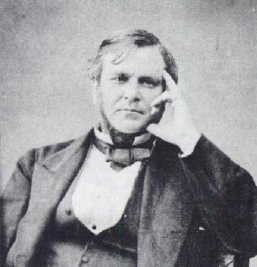- Edward Smith (physician)
Infobox Person
name = Edward Smith

image_size =
caption =
birth_date = 1819
birth_place =Heanor ,Derbyshire Dictionary of National Biography now in the publicdomain]
death_date = 1874
death_place =education =
Queen's College, Birmingham , and graduated at theUniversity of London
occupation = physician and medical writer
spouse = yes
parents =
children =Edward Smith (1819-1874) was a British physician and medical writer, born at
Heanor ,Derbyshire . According to his obituary, he failed to inspire the friendship of his colleagues, but more recent evaluations have noted that he "deserves to be better remembered by nutritionists, both for his contributions to the physiological basis of nutrition, and for his pioneering field surveys of dietary intake in relation to need among low income social groups". He worked out that prisoners who were fed on a diet of 93% carbohydrates would not be able to perform hard labour (and would therefore be more likely to resort to crime).Life
Smith was educated at Queen's College,
Birmingham , and graduated at theUniversity of London , MJB. in 1841, MD in 1843, and BA and LLB in 1848. In the following year he visited north-eastTexas , to examine its capacity as a place of settlement for emigrants, and published an account of the journey and a report with charts of temperature and the new constitution of the state (London, 1849). In 1851 he passed the examination for the diploma of fellow of theRoyal College of Surgeons of England and in 1854 he became a member of theRoyal College of Physicians , London, and in 1863 was elected a fellow of the college.Physiological chemistry occupied much of his attention and he developed an earlyspirometer . In 1856 he read his first paper. Edward was very interested in the workings of the human body and would frequently take measurements of his own body temperature and pulse, sometimes over fifty times a day. He later became interested in the body's use of urea and again made over 1400 different observations. [http://jn.nutrition.org/cgi/reprint/121/10/1515.pdf Detailed study of his work at nutrition.org] accessed 8 October 2007] Meanwhile Smith, in 1853, held the office of lecturer and demonstrator of anatomy at theCharing Cross Hospital school of medicine, and was appointed in 1861 assistant physician to the Brompton Hospital for . In 1862 he published "Consumption: its Early and Remediable Stages". He had previously published several papers on the pulse and the use of certain remedies inphthisis .Dietetics formed the subject of most of his subsequent literary work. He looked at the diet of prisoners, particularly those who were subjected to using a treadmill such as the one inBrixton prison . He decided to go to prison and join the others to investigate the diet in the prison system. He inspired two German researchers to investigate the prevailing idea thatprotein alone powered muscles.Adolf Eugen Fick andJohannes Wislicenus climbed theSwiss Alps after removing protein entirely from their diet. They were then able to balance the food they had consumed against the gain inpotential energy .Ira Wolinsky, Nutrition in Exercise and Sport, 1998 CRC Press, ISBN 0849385601] They were able to show as Smith had suggested that the chemical energy required for muscular effort does not come primarily from consumed protein but fromfat s andcarbohydrate s. [ [http://www.cambridge.org/us/books/kiple/proteins.htm Cambridge World of Food] accessed 13 October 2007]Edward Smith died of
pneumonia in 1874.Works (incomplete)
* "A Manual for Medical Officers of Health", 1873; 2nd edit. 1874
* "A Handbook for Inspectors of Nuisances", 1873, 8vo. 10.
* "Health: a Handbook for Households and Schools", 1874References
Further reading
* [http://jn.nutrition.org/cgi/reprint/121/10/1515.pdf Detailed study of his work at nutrition.org] accessed
8 October 2007
* "Edward Smith (1818–1874) Physiologist, Human Ecologist, Reformer," Chapman, J., "Hist Med Allied Sci".1967; XXII: 1-26
*" [http://www.cambridge.org/us/books/kiple/proteins.htm Cambridge World History of Food] " accessed October 2007
Wikimedia Foundation. 2010.
